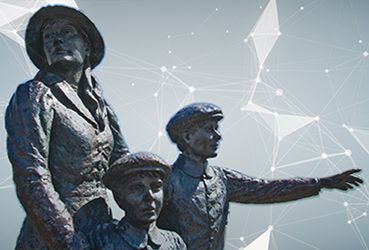Boosting life chances for resettled refugees
Software developed by an international team including Dr Alex Teytelboym from Oxford University is helping to resettle refugees in communities where they are more likely to flourish.
 TEYTELBOYM Boosting life chances for resettled refugees.
TEYTELBOYM Boosting life chances for resettled refugees.(Credit: Refugees.AI)
Resettled refugees and their families can thrive in countries such as the UK and US and make a huge contribution to their host destinations. But research has shown that the local communities where refugees are first settled is crucial in determining how well they do overall.
“The chances of gaining employment and integrating are greater when refugees are resettled into communities that best suit their hopes and aspirations,” explains Dr Alex Teytelboym. “It’s also vital to make sure communities can offer the services that refugees need.”
Often too little attention is given to finding the appropriate resettlement destination for refugees and, even if it is done carefully, it can be a complex and time-consuming process. Now pioneering software developed by international collaboration Refugees.AI is ensuring refugees and communities are appropriately matched and boosting effective settlement.
The Annie™ MOORE (Matching and Outcome Optimisation for Refugee Empowerment) software was developed in part out of Teytelboym’s economic research on matching with complex constraints, and uses machine learning to assess people’s needs, skills, and aspirations against local services and opportunities.
Named in honour of Annie Moore, the first immigrant to be processed at Ellis Island in the US in 1892, Annie™ considers local factors that predict refugee employment and local services such as single-parent support. Annie™ is flexible and easy-to-use, allowing cross referencing between cases and searching against numerous multi-dimensional criteria. The software suggests optimised refugee placements to resettlement workers, leaving them to make final decisions.
US resettlement agency HIAS has been using Annie™ since 2018 and has so far matched over 1,100 refugees. Annie™ has boosted employment among refugees resettled by HIAS by around 30 percent and also ensures that all communities can provide the services needed – which has significantly improved integration. Arrivals Director, Karen Monken, comments: “I now spend 80 percent less time on routine matching and can focus my time and energy on the more difficult cases.”
HIAS is now discussing the use of Annie™ with other resettlement agencies. President-elect Biden has committed to resettling 125,000 refugees a year in the US which will mean that Annie™ could make a huge impact in the coming years. Other countries such as Sweden and the UK are also considering the use of Annie™.
Teytelboym comments: “Only a tiny fraction of the world’s refugees are resettled to rich countries such as the US or UK; but we often hear that these countries are ‘doing enough’ and that refugees may be a ‘burden’ to local communities. Annie™ is helping reshape the debate – enabling more effective resettlement and showcasing the contribution refugees make to communities, wider society, and the economy.”
Alex Teytelboym is an Associate Professor at the Department of Economics, a Tutorial Fellow at St. Catherine’s College, and a Senior Research Fellow at the Institute for New Economic Thinking at the Oxford Martin School
Refugees.AI is an international collaboration between researchers in the UK, US, and Sweden.
The original version of Annie™ was developed by Andrew Trapp and Narges Ahani (Worcester Polytechnic Institute), Tommy Andersson and Alessandro Martinello (Lund University) and Alex Teytelboym (University of Oxford)
Funders: ESRC, National Science Foundation, Jan Wallander and Tom Hedelius Foundation, Ragnar Söderberg Foundation, Skoll Centre for Social Entrepreneurship Research Accelerator Grant